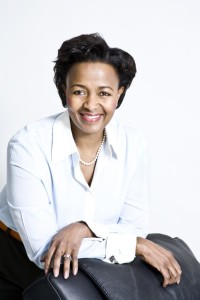Knowledge@Wharton: You describe yourself as an economic activist. You’re based in South Africa. What is an economic activist?
Wendy Luhabe: In my case, it’s focusing on the participation of women in the economy. When I thought about what we’ve been doing, I realized that you hear of social activists or political activists, but you don’t hear of economic activists. The work we’ve done deserves the description. We pioneered two ventures: the first one was an investment company we started 20 years ago. It mobilized 18,000 women to become investors for the first time through a platform called Women Investment Portfolio Holdings. The company is still in existence. It has a value of about $200 million.
After that, about 10 years later, we started a private equity fund for women, which was also an unheard of concept in the world. There are less than 10 funds that are focusing on women-owned enterprises. This was definitely the first and probably still the only one in Africa.
Knowledge@Wharton: That company still exists as well?
Luhabe: The fund has closed but several of the investments are still in existence.
Knowledge@Wharton: In the private equity company, were you solely focused on investing in women-owned businesses?
Luhabe: Yes.
Knowledge@Wharton: In the first case, it was women investors?
Luhabe: Yes. In the second case, it was investing in companies owned by women. My view is that if we grow the number of women entrepreneurs and give them access to capital and the business expertise to enlarge their businesses, they will contribute towards creating jobs, which is a major challenge in South Africa.
“We wanted to take women beyond that to say, you can provide labor and you can consume, but you can also be an investor responsible for your own financial independence.”
Knowledge@Wharton: How did you come to this? What was your pathway that led to these very bold and entrepreneurial moves?
Luhabe: It was a combination of things. South Africa was becoming a democracy and we had politicians who were committed to gender empowerment and passed legislation that made it possible. So it was largely the environment. Observing that as the political landscape was being rearranged and women were being left out, we decided that we would create our own opportunities rather than wait to be invited. That’s how it happened.
Knowledge@Wharton: You had a background in finance?
Luhabe: I studied commerce. I didn’t work in commerce or finance, but I studied it. I worked in marketing. My first 10 years were in marketing. But the three cofounders came from finance; all three were in banking. That’s why I handpicked them, so that we wouldn’t be ignored because we didn’t understand the industry we were getting into.
Knowledge@Wharton: As an economic activist now, what is the focus of your activities?
Luhabe: Communicate economic empowerment. I’ve invested in a micro bakery project that will have a footprint of about 400 bakeries throughout South Africa. It will enable women to generate an income of 5,000 rand a month — about $500 a month — from zero to $500 a month, making their own bread and supplying it to their immediate neighborhood.
Knowledge@Wharton: You are an investor in this? You helped to grow the business?
Luhabe: I am. I’m identifying economic opportunities that can help uplift communities. The first project we’ve done is the bakery. It’s not mine; it’s an existing project that I have invested in to help scale it. I’ve invested in an agricultural project in the southern part of the country in a community that owns land, but didn’t have the resources to invest in seeds. I discovered that seeds for agriculture are the most expensive part. So I invested to enable them to buy the seeds.
Knowledge@Wharton: In your years of doing this kind of work are there lessons that you’ve learned or that you’ve discovered that are very helpful for scaling these kinds of businesses, for knowing that this bakery is a good idea, it will work and we can scale it?
Luhabe: I can’t answer that because I’m not operational. I’m an investor. So you would need to talk to people who are operational. I’m sure there must be many lessons. Because when you are pioneering and you are on the ground, you’re responding to issues as they develop. I think the tragedy is that those lessons don’t get documented.
Knowledge@Wharton: There’s certainly a lot of interest. To this day you are quite pioneering in bringing women into investing.
Luhabe: It hasn’t been done. When we started it, it had never been done and it still hasn’t been done. I’m not sure why because we’ve traveled extensively to share the idea. Somehow people just haven’t been able to get it off the ground. I don’t know whether in our case it was because of the confluence of a change in the political system and people feeling quite optimistic about the future and the opportunities opening up.
Knowledge@Wharton: If you were to tell us the typical woman who invested in that fund, who was she?
Luhabe: What’s actually quite unique about this is that it mobilized South African women from all walks of life. So there were white women, black women, ordinary women, wealthy women, educated women, uneducated women, rural women, urban women. What we did and how we were able to do that is because we invested two years before the company was established doing a roadshow which was called Beyond Labor and Consumption. We felt that all that women were considered good for in the economy was to provide labor, or we consume, we buy. We wanted to take women beyond that to say, you can provide labor and you can consume, but you can also be an investor responsible for your own financial independence.
It was because of that roadshow. It took us about two years. We have nine provinces in South Africa and it went to every single province and spoke to women from all walks of life.
Knowledge@Wharton: I would imagine that there would be a barrier with married women feeling like they couldn’t invest their family’s wealth, that the men controlled it or the men had to approve. Did you have to win over the men as well?
Luhabe: We actually had men who bought shares for their wives and their daughters and their helpers. South Africa is fortunate. We are lucky that we have help in our homes. So we had a lot of white families who actually bought shares for their helpers as well. So we really mobilized the nation and people got behind it.
Knowledge@Wharton: What are the sort of challenges and opportunities that you’re seeing now for women entrepreneurs in South Africa?
Luhabe: I think it’s the same issues as everywhere else: access to capital, to expertise, the knowhow, the ecosystem. South Africa doesn’t have an ecosystem for entrepreneurs. Although we have a well-established financial services sector, it doesn’t support entrepreneurs. It’s totally risk averse.
“It mobilized South African women from all walks of life. So there were white women, black women, ordinary women, wealthy women, educated women, uneducated women, rural women, urban women.”
We don’t have a venture capital culture. There is an element of angel investing, but it’s still very limited. We have private equity, but private equity doesn’t invest in start-ups. So we have pockets of things. We have lots of government funding, but it doesn’t really reach the opportunities that are in the marketplace because we lack the ecosystem. They just don’t know how to assess projects and opportunities and risks. The funds usually go unspent. They don’t go where they are supposed to go to because of that lack of an ecosystem in the economy.
Knowledge@Wharton: But somehow you broke through this many years ago.
Luhabe: It was because we were right at the beginning, before there were rules and laws and things. We kind of made it up. Sometimes that’s an advantage when there’s nothing in existence, you can make it up.
The empowerment initiatives that existed at the beginning of our democracy were driven by a few individuals who were primarily men. What we started was the first one that mobilized large numbers of individuals, with a focus on women obviously in our case. That was an example of what I think the government intended with economic empowerment, to make it broad based in a meaningful way.
Knowledge@Wharton: Are there any key skillsets or talents or abilities that you feel you had to employ to be successful in this?
Luhabe: Well, three of my cofounders came from the banking sector, so they understood what we were trying to do. We were offering a solution in a sector that we understood. They were known in the industry and they understood the industry.
What I didn’t tell you is that we did two capital raisings from the women themselves. The first was 25 million rand. We needed to do a second one and raised 75 million rand. The first 100 million rand to get this company off the ground and to acquire equity in the various industries came from women themselves. Because of that, by the time we raised institutional funding we had already proven the concept.
Knowledge@Wharton: Where do you see your work taking you over the next five years?
Luhabe: I’m beginning to invest in Africa. I’m going to invest in the food business in Kenya. I’m going to invest in Nigeria. I’m going to begin investing outside South Africa.

Click HERE for more.

good evening sis Wendy I read about you from DESTINY Magazine and felt motivated.I am currently studying financial accounting and working at the same time,For me to do Financial accounting its because I had a dream of being a CEO.But as a grow my passion for finance also grew in a point that everyday that involve the economy I watch or listen.I have a desire of helping women to grow from the “Comfortable” positions and stand up and come to sit in front tables, In my head iv got lot of ideas that I just want to see them happening not just ending as dream. Where i come from young women their dreams is to work in farms or get married to a man working in mine,I would like to see myself making changes in lives of people like that. I have dreams about myself also of where I want to be I would like to have a mentor who can help me achieve that goal so that I can also mentor other people. Your assistance will be highly appreciated as I am a young woman with dreams but struggling does not know where to start.